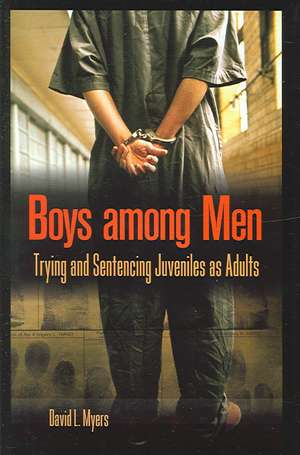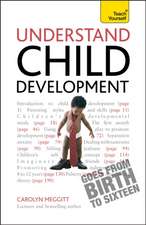Boys among Men: Trying and Sentencing Juveniles as Adults: Criminal Justice, Delinquency, and Corrections
Autor David L. Myersen Limba Engleză Hardback – 29 iun 2005 – vârsta până la 17 ani
Preț: 287.19 lei
Preț vechi: 349.46 lei
-18% Nou
Puncte Express: 431
Preț estimativ în valută:
54.97€ • 59.73$ • 46.21£
54.97€ • 59.73$ • 46.21£
Carte tipărită la comandă
Livrare economică 21 aprilie-05 mai
Preluare comenzi: 021 569.72.76
Specificații
ISBN-13: 9780275982546
ISBN-10: 0275982548
Pagini: 208
Dimensiuni: 156 x 235 x 19 mm
Greutate: 0.48 kg
Editura: Bloomsbury Publishing
Colecția Praeger
Seria Criminal Justice, Delinquency, and Corrections
Locul publicării:New York, United States
ISBN-10: 0275982548
Pagini: 208
Dimensiuni: 156 x 235 x 19 mm
Greutate: 0.48 kg
Editura: Bloomsbury Publishing
Colecția Praeger
Seria Criminal Justice, Delinquency, and Corrections
Locul publicării:New York, United States
Notă biografică
David L. Myers is Associate Professor of Criminology and a Dean's Associate in the School of Graduate Studies and Research at Indiana University of Pennsylvania, where he also directs the Doctoral Program in Criminology and the Center for Research in Criminology. He is a member of the IUP Research Institute Advisory Board and the Institutional Review Board of the National Center for Juvenile Justice, as well as an Associate Editor and Columnist for Criminal Justice Research Reports. He is the author of Excluding Violent Youths from Juvenile Court: The Effectiveness of Legislative Waiver (2001), and his articles have appeared in such journals as Youth Violence and Juvenile Justice, Journal of Juvenile Justice and Detention Services, Criminal Justice Review, Justice Research and Policy, and Criminal Justice Studies.
Cuprins
AcknowledgmentsSeries ForewordAdult Crime, Adult TimeSeparating the Men from the BoysTransformation to CriminalWho Gets Transferred?What Happens in Adult Court?Prospects for Punishment and RehabilitationGeneral and Specific DeterrenceThe Rise and Fall of "Adult Crime, Adult Time"ReferencesIndex
Recenzii
In this exceptional overview of the process of juvenile waivers to adult court, Myers includes a detailed account of the history of the juvenile court system and does an excellent job of discussing the social and political context surrounding increases in transfers. He also gives clear descriptions of types of transfers as well as the process by which transfers occur, with a fair synopsis of prosecutorial and judicial discretion that should be easily understood by undergraduates and others not familiar with the juvenile justice system..Recommended.
Public pressure has led most U.S. states to pass laws making it easier to waive juvenile offenders to adult criminal court. Myers traces the history of this trend, weighs the underwhelming research support for this policy, and offers a framework for discussing youth violence issues.
Public pressure has led most U.S. states to pass laws making it easier to waive juvenile offenders to adult criminal court. Myers traces the history of this trend, weighs the underwhelming research support for this policy, and offers a framework for discussing youth violence issues.


















